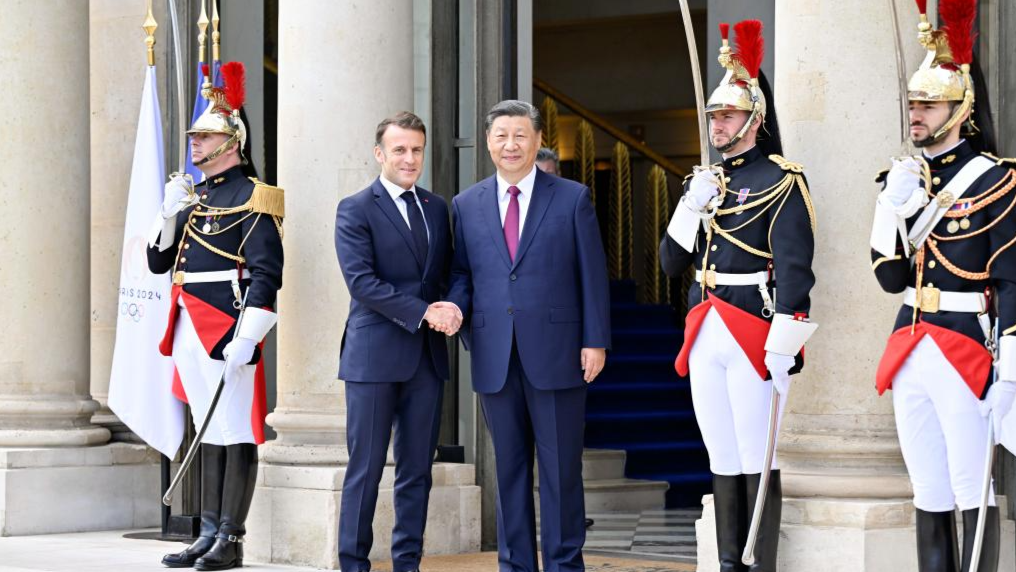
China and France have assumed their responsibility as world powers and United Nations Security Council (UNSC) members by reiterating their commitment to a lasting two-state solution to the Middle East crisis instead of fueling its escalation, according to analysts.
They say Chinese President Xi Jinping and French President Emmanuel Macron displayed “moral clarity” on the Gaza conflict during their recent bilateral meeting.
The two leaders reaffirmed their commitment to the two-state solution, which “is the only way to meet the legitimate aspirations of the Israeli and Palestinian people for lasting peace and security”
Both leaders called for an irreversible return of the political process to implement a two-state solution and sustainable delivery of humanitarian aid.
READ MORE: Xi: China, France should uphold independence, fend off ‘new Cold War’
In their joint statement on May 7, made during the Chinese president’s state visit to France, Xi and Macron reiterated their call for Israel and Palestine “to live side by side in peace and security”.
The two leaders reaffirmed their commitment to the two-state solution, which “is the only way to meet the legitimate aspirations of the Israeli and Palestinian people for lasting peace and security”.
“President Xi Jinping’s meeting with the French leader last week signaled alignment as both nations sought a cessation of hostilities,” Belal Alakhras, a political analyst and Palestinian researcher at the University of Malaya in Malaysia, told China Daily.
“External crises have often been exploited to drive rifts but the moral clarity of the situation in Gaza prompted unity in demanding an end to the bloodshed,” Alakhras said.
“This approach highlights a stark contrast to the US, which enabled the genocide in Gaza by providing billions in military aid (to Israel), intelligence support, vetoing ceasefire resolutions, and even suppressing student activism protesting these atrocities on American campuses,” he added.
He said China’s active diplomacy indicated a more principled foreign policy, rather than “perpetuating unilateral agendas to assert spheres of influence at all costs, like some traditional powers”.
A resolution calling for the reevaluation of Palestine's UN membership bid and upgrading its rights passed with overwhelming support on May 10, with 143 member states — including China — voting in favor, nine against, and 25 abstentions
The Gaza conflict, he added, provided an opportunity for China to find common ground with other countries appalled by the escalating atrocities.
Long before tensions escalated in the region on Oct 7 last year, China had called for lasting peace between Israelis and Palestinians. Most notably it announced a plan to invite Israelis and Palestinians for talks in Beijing in 2021. China also sent $2 million of humanitarian aid to Gaza last October.
Last month, China invited representatives of the Palestinian National Liberation Movement (Fatah) and the Islamic Resistance Movement (Hamas) to Beijing for in-depth and candid talks on promoting intra-Palestinian reconciliation.
On May 10, China expressed support for the UNSC to reconsider Palestine's application to join the world body.
According to China's permanent representative to the UN Fu Cong, “Palestine should have the same status as Israel" and it is the international community's "common responsibility to support and advance the process of Palestine's independent statehood", Xinhua News Agency reported.
A resolution calling for the reevaluation of Palestine's UN membership bid and upgrading its rights passed with overwhelming support on May 10, with 143 member states — including China — voting in favor, nine against, and 25 abstentions.
Those who voted against it were the US, Israel, Hungary, Argentina, Micronesia, Nauru, Palau, Czechia and Papua New Guinea.
“In the United Nations and the General Assembly, China always stands, stood, is still standing, and will stand with Palestine,” Ayman Yousef, a professor of international relations at the Arab American University in Jenin in the West Bank, told China Daily.
According to Yousef, China’s relationship with Israel should be taken into account when dealing with Chinese policy in the Middle East and its relations with Arab countries or even countries like Iran and Pakistan, with which China has “smooth and excellent relations”
Yousef noted that historically, culturally, and politically, China has had “very good relations” with all Arab countries, particularly Egypt and Algeria. Now there are “growing economic relations with Gulf countries, especially Saudi Arabia”, he added.
At the same time, China has had smooth relations with Israel since both countries established diplomatic ties in 1992, Yousef added.
China has consistently asked Israel “to withdraw its forces from Occupied Palestinian Territories” and called for a two-state solution but “without clear political and economic pressures on Israel”, he noted.
READ MORE: Full text: China-France Joint Statement on the Situation in the Middle East
According to Yousef, China’s relationship with Israel should be taken into account when dealing with Chinese policy in the Middle East and its relations with Arab countries or even countries like Iran and Pakistan, with which China has “smooth and excellent relations”.
These unprecedented times call for unprecedented change, according to Alakhras from the University of Malaya, as the world has witnessed how the self-serving interests of an unchecked superpower can jeopardize global security.
“China’s resolute stance in defusing this conflict has elevated its stature but it may need to capitalize on this momentum. Further investing in principled multilateralism will continue garnering goodwill and buttressing China’s role as a stabilizing force for the collective good,” he added.
Contact the writer at jan@chinadailyapac.com


